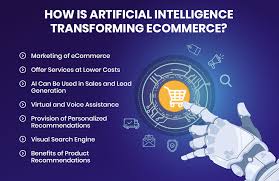In today's digital age, a website has become an essential tool for any business, regardless of its size. For small businesses, a website serves as a digital storefront, offering a 24/7 presence and a platform to connect with customers worldwide. Moreover, the integration of e-commerce capabilities empowers small businesses to expand their reach, increase sales, and build lasting customer relationships. This white paper delves into the critical reasons why small businesses need a website and the advantages of incorporating e-commerce solutions.
The Indispensable Role of Websites and E-commerce for Small Businesses
In today's digital age, a website has become an essential tool for any business, regardless of its size. For small businesses, a website serves as a digital storefront, offering a 24/7 presence and a platform to connect with customers worldwide. Moreover, the integration of e-commerce capabilities empowers small businesses to expand their reach, increase sales, and build lasting customer relationships. This white paper delves into the critical reasons why small businesses need a website and the advantages of incorporating e-commerce solutions.
Why Small Businesses Need a Website
1. Enhanced Visibility and Brand Awareness:
- Search Engine Optimization (SEO): A well-optimized website improves search engine rankings, making it easier for potential customers to find your business through organic search results.
- Social Media Integration: Integrating social media platforms into your website can amplify brand visibility and drive traffic to your site.
- Digital Marketing Campaigns: Websites serve as a central hub for digital marketing efforts, such as email marketing, pay-per-click advertising, and content marketing.
2. 24/7 Online Presence:
- Global Reach: A website transcends geographical boundaries, allowing you to connect with customers from anywhere in the world.
- Round-the-Clock Accessibility: Customers can access information about your products or services at any time, day or night.
- Improved Customer Service: Online FAQs, contact forms, and live chat features provide efficient customer support.
3. Credibility and Trust Building:
- Professional Image: A well-designed website conveys professionalism and establishes credibility.
- Customer Reviews and Testimonials: Displaying positive feedback from customers can significantly boost trust and confidence.
- Secure Transactions: Implementing secure payment gateways assures customers of safe and reliable online transactions.
4. Cost-Effective Marketing:
- Reduced Marketing Expenses: Digital marketing through a website is often more cost-effective than traditional advertising methods.
- Targeted Marketing: By analyzing website analytics, you can tailor marketing campaigns to specific target audiences.
- Lead Generation: Effective website design and content can attract potential customers and generate leads.
5. Data-Driven Insights:
- Website Analytics: Tracking website traffic, user behavior, and conversion rates provides valuable insights into customer preferences and marketing effectiveness.
- Customer Relationship Management (CRM): Integrating CRM tools with your website enables you to collect and analyze customer data to improve future interactions.
The Power of E-commerce for Small Businesses
1. Expanded Market Reach:
- Global Marketplace: E-commerce platforms allow you to sell your products or services to a global audience.
- 24/7 Sales: Online stores enable continuous sales, even when your physical store is closed.
2. Increased Sales and Revenue:
- Convenient Shopping Experience: Online shopping offers customers a hassle-free and convenient way to purchase products.
- Upselling and Cross-Selling: E-commerce platforms facilitate the promotion of additional products and services.
- Inventory Management: Efficient inventory management ensures smooth operations and prevents stockouts.
3. Data-Driven Decision Making:
- Sales Analytics: E-commerce platforms provide detailed sales data, helping you identify trends and optimize your product offerings.
- Customer Behavior Insights: Analyzing customer purchasing patterns enables you to tailor marketing strategies and improve customer satisfaction.
4. Enhanced Customer Experience:
- Personalized Recommendations: E-commerce platforms can use customer data to offer personalized product recommendations.
- Seamless Checkout Process: A user-friendly checkout process minimizes cart abandonment and increases conversions.
- Secure Payment Options: Offering multiple secure payment options builds trust and encourages online purchases.
5. Cost-Effective Operations:
- Reduced Overhead Costs: E-commerce eliminates the need for physical storefronts, reducing operational costs.
- Efficient Order Fulfillment: Automated order processing and shipping systems streamline operations.
Conclusion
In today's competitive business landscape, a website and e-commerce capabilities are no longer optional for small businesses. By embracing these digital tools, small businesses can level the playing field with larger competitors, expand their customer base, and achieve sustainable growth. By understanding the critical benefits outlined in this white paper, small business owners can make informed decisions about their online presence and unlock the full potential of their businesses.
Reference List
- SCORE: 12 Reasons Why Small Businesses Need a Website. https://www.linkedin.com/pulse/5-reasons-why-every-business-needs-ecommerce-website-diggityus
- ShipBob: 6 Reasons Why An Ecommerce Website is Important. https://blog.hubspot.com/blog/tabid/6307/bid/38/five-legitimate-reasons-your-business-doesn-t-need-a-website.aspx
- Design Powers: 7 Reasons Why Every Small Business Needs a Website.
